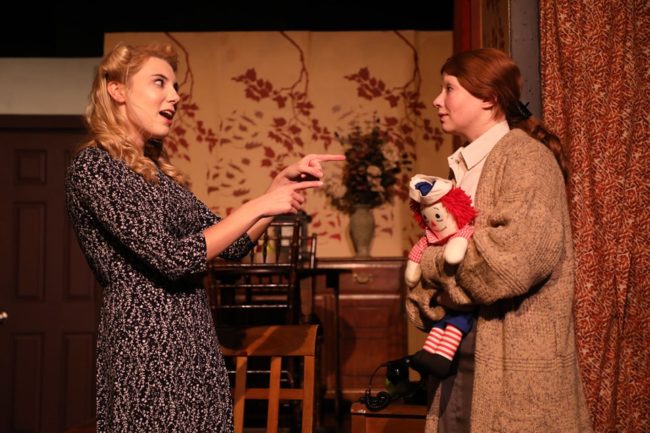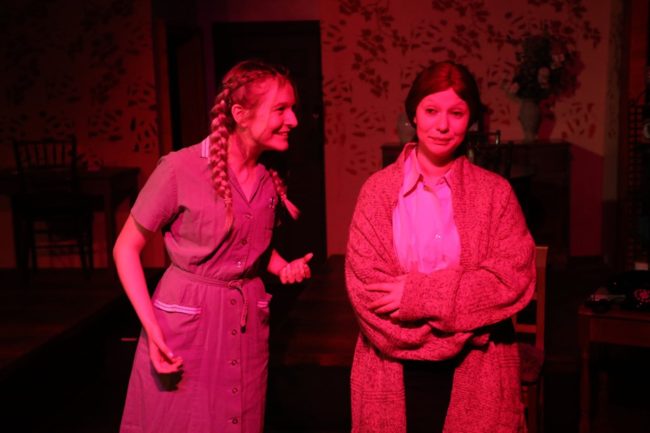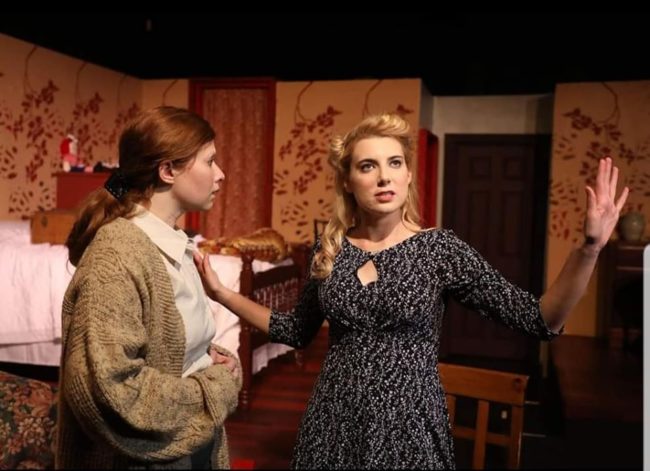A Shayna Maidel is a play I had never heard of, and that’s really a shame, because it was a powerful experience that left me thinking, for days. I’ve seen favorite plays performed in an underwhelming way, and also saw a play I didn’t anticipate liking performed by such talented thespians that I was converted to a fan, but the real treat with this particular production of A Shayna Maidel, at The Strand Theatre, is that you feel the noteworthy acting bringing Barbara Lebow’s message to life; this is the well written material being brought to life, the right way. This review will contain a lot of plot details, because I cared a lot about this plot, so be warned before reading on.

The story begins with a scenario that plays out in immigrant families, today, wherein there is a culture clash between the individualism of a family member more culturally assimilated into the American experience and the needs of the rest of the family. I can’t count how many times I’ve seen cases of this being the core of an entire movie, play, musical, or life struggle, which is why it works so well as a jumping off point for a story that cuts as deeply as this one does. Rose, portrayed by Christie Smith, is believably upset by her father’s orders to take care of a newly arriving sister, from Poland. It took some suspension of disbelief to get past the idea that she, as an adult, would cave to his order, giving up her bed to sleep on a couch, for a person she doesn’t know, but we soon learn why this is the case. Perhaps we’ve all had that unwanted guest we have to take care of, on someone else’s behalf, and she acts this frustration well, masking it with an uncomfortably aggressive expression of care for newly met guest, Lusia, played by Emilie Zelle Holmstock. This unwanted guest dynamic changes to a more serious situation as Lusia’s nerves appear frayed from being lost in a strange new world; perhaps a little too frayed to be believed, as she seems to almost be shaking. Just as in the case of Rose’s acceptance of her predicament, Lusia has reasons for who she is, and Lebow begins exposing us to them through a series of flashbacks and dreams or fantasies that show us the factors that lead to these sisters becoming who they are.
Mordechai, also known as Father, played by Alan Barnett, who wears his past as a thick Yiddish accent, is a soft spoken immigrant, until he doesn’t get exactly what he wants. He is so insistent on the quality and rigor of hospitality he demands Rose provide to Lusia that he demands Lusia be given only kosher food, which we later discover is a luxury she isn’t used to, as she has lived through times when any food at all would have been treasured. While he seems to care about Lusia’s best interests, demanding she wear a coat, his frustration erupts into shouts about wasting food if given a single extra slice of bread, and like a bystander watching two parents emotionally abuse one another, in front of innocent children, I began to fidget in my seat from the nerves I vicariously felt through the expressions and mannerisms of these daughters.

Just as
we start to know today’s characters, Mark Reamer’s lighting design changes the
tint of Gaya Sel’s set design and we are in another time and place. Props designs by Erin Riley are minimalistic
enough not to distract from the heart of what is going on in each scene, and
get their job done fabulously; the same tin of cookies appears as a contraband
snack of Americanized Rose, and provides a an unexpected thread that ties the
sisters together, even if Mordechai would scream if he knew of them. The first trick of time travel is it allows
us to see a time when the misery fades to innocence as Emilie Zelle Holmstock’s
Lusia spends time with her surrogate sister, Hanna, played by Anna Adelstein. Lebow has the girls gossip of crushes, and
one memory builds on another as we see them bond into adulthood and finally be
separated by a life no one should have, all the while explaining the
significance of the child’s doll that Lusia has carried to America. Hanna’s scenes represent moments when we first
see truly happy people, outside of the niceties of a host and guest
interacting, or children dealing with the expectations of a demanding father,
so it comes as all the more shock and much credit to Adelstein when her Hanna
starts coming apart at the seams, as their reality goes from bad to worse, to
impossible. Those happy children’s faces
lift us up as we meet Hillary Mazer’s portrayal of Mama, who gives us a break
from Mordechai’s stern love, serving motherly compassion in its place, but it
is from this height of emotional relief that we must come crashing back down by
the time Hanna’s role has unfolded.
I went out of my way to leave Lusia’s husband out of this review, until this
point, because the scenes where Lusia encounters him in a dream, in a memory,
in a fantasy, or only in the speaking of his name, are often the brightest
moments in a storm of recovery that all of the present-day characters are
straining to pull through, but also because their chemistry and acting was
astounding. “Why should a play I see in
Baltimore be this impressive?”, is what I kept asking myself, as I walked to
the car, to drive away, at the end of this story. Duvid, played by David Shoemaker, strongly
reminded me of a real man I know, playfully lifting Lusia in the air, so
effortlessly loving every minute of it, as if we are actually seeing not a
flashback but vivid, living, honest love of a good couple – which serves to put
our hearts in touch with why Lusia dedicates her life to finding him, refusing
to move on and willing to pay any price.
Duvid comes off as very lovable, and he is loved, thus you begin rooting
for him to be found a lot harder than you may have been, even after learning
other sad news, many times.

As this
show draws near its end Mordechai’s opposite comes into focus, as Mamma is
present when he presents Rose with a letter from her mother, which he has been
keeping a secret from her. This turns
our understanding of his motivations on its head, as Lusia accuses him of
hiding the letter out of guilt over his failing to use every means at his
disposal, out of his own stubbornness, to bring the second half of his family
to America before it was too late. We’ve
been through the wringer traveling through the travesties of Lusia’s past, but
have only seen Rose feel guilt at having not been in Lusia’s place, but as Rose
begins to realize Mordechai has kept things from her, the whole family comes to
grips with their past as their father’s silent and tormented face confirms the
story. It is through this scene that the
sisters finally are truly bonded, Mamma present in spirit. If there is a hard
time the audience hasn’t lived through, you might think this is it.
Still, the final scene promising some closure in the form of an epilogue has
our heart racing as some news of Duvid is forshadowed by talk of a phone
call. The final credit I will give to
Barbara Lebow is that her choice to reuinite Lusia with Duvid, and the means of
closing this play with the outcome of that choice were the final bit great
acting in the film, and I give Intimacy Coach Mallory Shear some credit for
whatever percent of that chemistry she was responsible for, which kept this so
organic and natural.
I may see this play again, with the same cast, and I mention that to take all
exclamatory exaggeration out and infuse this recommendation with a serious
suggestion that you shouldn’t miss this show if you have family history that
relates to it, in any way, a compassion for these subjects, or more
importantly, a love of good acting and quality storytelling. Run out and see it today.
Running Time: Approximately 2 hours and 15 minutes with one intermission
A Shayna Maidel plays through November 3, 2019 at The Strand Theatre— 5426 Harford Road in the Hamilton neighborhood of Baltimore, MD. For tickets, call the box office at (443) 874-4917 or purchase them online.

